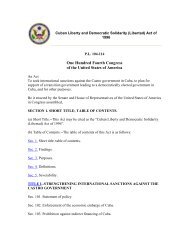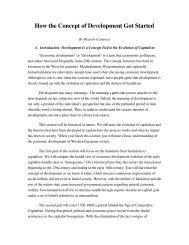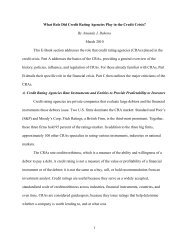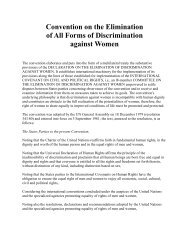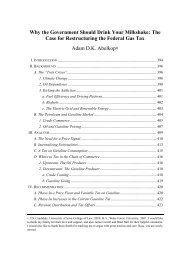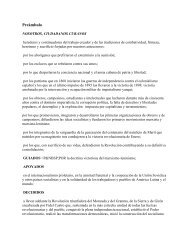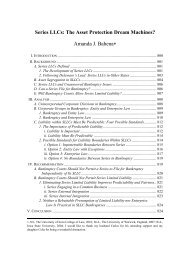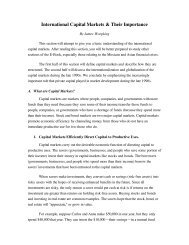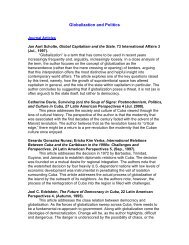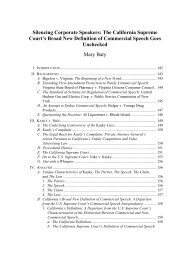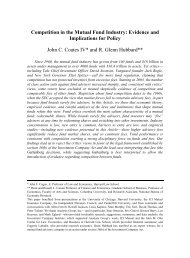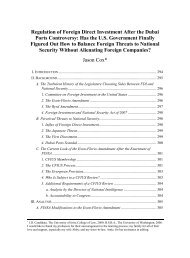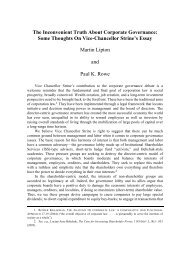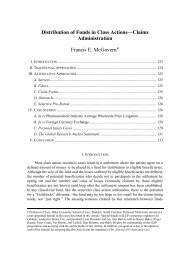Galactic Stupidity and the Business Judgment Rule - College of Law
Galactic Stupidity and the Business Judgment Rule - College of Law
Galactic Stupidity and the Business Judgment Rule - College of Law
Create successful ePaper yourself
Turn your PDF publications into a flip-book with our unique Google optimized e-Paper software.
2007] <strong>Galactic</strong> <strong>Stupidity</strong> 311<br />
“reasonable” director st<strong>and</strong>ard seems too strict because <strong>the</strong> very term carries with it <strong>the</strong><br />
suggestion that only one—or perhaps a few—courses <strong>of</strong> conduct were reasonable under<br />
any given set <strong>of</strong> circumstances.<br />
Since <strong>the</strong> “reasonable director” st<strong>and</strong>ard is disfavored, some o<strong>the</strong>r st<strong>and</strong>ard, not too<br />
strict <strong>and</strong> not utterly lacking in teeth, must prevail. Ra<strong>the</strong>r than asking whe<strong>the</strong>r a director<br />
acted “reasonably,” courts <strong>of</strong>ten asked whe<strong>the</strong>r she acted “rationally.” Former Chancellor<br />
Allen <strong>and</strong> Chancellors Jacobs <strong>and</strong> Strine argue that “a rationality st<strong>and</strong>ard gives directors<br />
greater freedom to make risky decisions than a reasonableness st<strong>and</strong>ard.” 58 And <strong>the</strong>y<br />
attempt to draw a distinction between <strong>the</strong>se two st<strong>and</strong>ards (reasonable <strong>and</strong> rational) by<br />
defining an irrational decision as one “that is so blatantly imprudent that it is<br />
inexplicable, in <strong>the</strong> sense that no well-motivated <strong>and</strong> minimally informed person could<br />
have made it.” 59 But it is not obvious how much broader this st<strong>and</strong>ard really is than a<br />
reasonable director st<strong>and</strong>ard. What kind <strong>of</strong> behavior does not pass <strong>the</strong> reasonable director<br />
st<strong>and</strong>ard that would pass <strong>the</strong> rationality test as described above? Nei<strong>the</strong>r <strong>the</strong> requirement<br />
<strong>of</strong> prudence, good motivation, nor minimal information seems to allow much behavior<br />
that would not already be permissible under <strong>the</strong> requirement that a director act<br />
reasonably. It is not clear, <strong>the</strong>n, how <strong>the</strong> widely accepted rationality st<strong>and</strong>ard differs in<br />
reality from <strong>the</strong> much-shunned reasonableness st<strong>and</strong>ard. Indeed, application <strong>of</strong> <strong>the</strong><br />
rationality st<strong>and</strong>ard <strong>of</strong>ten sounds a lot like an application <strong>of</strong> <strong>the</strong> reasonableness st<strong>and</strong>ard,<br />
<strong>and</strong> <strong>the</strong>refore an inquiry into <strong>the</strong> substance <strong>of</strong> <strong>the</strong> directors’ decision.<br />
In a well-known case in which a board <strong>of</strong> directors was accused <strong>of</strong> breaching its<br />
fiduciary duty to accept <strong>the</strong> highest price available in a tender <strong>of</strong>fer, Chancellor Allen<br />
allowed <strong>the</strong> directors business judgment rule protection. 60 Though he explicitly rejects<br />
<strong>the</strong> idea that he has engaged in substantive review <strong>of</strong> <strong>the</strong> directors’ action, much <strong>of</strong> his<br />
language sounds very much like an inquiry into its substance:<br />
it was not beyond <strong>the</strong> range <strong>of</strong> reasonable responses, in <strong>the</strong> circumstances in<br />
which <strong>the</strong> overall objective was to get a committed deal at $64 per share cash<br />
from [<strong>the</strong> bidder] . . . . These are precisely <strong>the</strong> sort <strong>of</strong> debatable questions that<br />
are beyond <strong>the</strong> expertise <strong>of</strong> courts <strong>and</strong> which <strong>the</strong> business judgment rule<br />
generally protects from substantive review for wisdom . . . . Certainly, <strong>the</strong><br />
decision... in <strong>the</strong>se circumstances does not fall so far afield <strong>of</strong> <strong>the</strong> expected<br />
range <strong>of</strong> responses to warrant an inference that [<strong>the</strong>y] must have been<br />
motivated by a concern o<strong>the</strong>r than maximizing <strong>the</strong> value <strong>of</strong> shareholders’<br />
interest. 61<br />
Here, Chancellor Allen appears to be asking whe<strong>the</strong>r <strong>the</strong> proverbial “reasonable”<br />
director might have done <strong>the</strong> same thing under <strong>the</strong> circumstances; whe<strong>the</strong>r <strong>the</strong> director’s<br />
Public Policy: A Critique <strong>of</strong> Van Gorkom <strong>and</strong> its Progeny as a St<strong>and</strong>ard <strong>of</strong> Review Problem, 96 NW. U. L. REV.<br />
449, 454 (2002). The authors (two Delaware chancellors <strong>and</strong> a former chancellor) use <strong>the</strong> case <strong>of</strong> automobile<br />
accidents as an example. They point out that in that context, “only one decision is reasonable in a given set <strong>of</strong><br />
circumstances, so decisions that turn out badly almost invariably turn out to have been bad decisions.” Id. In<br />
contrast, if <strong>the</strong> business judgment rule st<strong>and</strong>s for anything at all, it is that decisions that turn out badly are not<br />
necessarily bad decisions. Id.<br />
58. Id. at 452.<br />
59. Id. at 452 (emphasis added).<br />
60. In re J.P. Stevens & Co., Inc., 542 A.2d 770 (Del. Ch. 1988).<br />
61. Id. at 783 (emphasis added).



